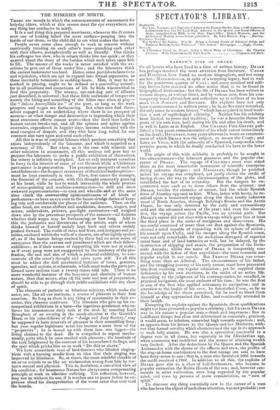THE MISERIES OF MIRTH.
THERE are moods in which the announcements of amusement for holyday idlers, which at this season meet the eye everywhere, are any thing but conducive to mirth.
It is a sad thing this prepared merriment, whenever the fit comes over one of looking below the mere surface—peeping into the inside of our drum, as the child did to see what makes the noise.
People never come close enough to work in concert without continually treading on each other's toes—punching each other with their elbows, metaphorically as well as literally. One thinks his colleague too slow, who in return thinks him too quick ; or they quarrel about the share of the burden which each takes upon him to lift. The master of the works is never satisfied with the ex- ertions he gets out of those under him ; and the labourers think the easiest taskmaster too hard. Hence come peevish exclamations and rejoinders, which are apt to expand into formal arguments, as these inevitably terminate in scolding-bouts. Mau, it may be re- marked in passing, ought to be defined as a quarrelling animal; for in all positions and connexions of life he finds wherewithal to feed this propensity. The uneasy, cat-and-dog sort of alliance just described, is universal ; but these little outbreaks of temper are merely the biting and scratching of the feline race when at play— the " dulces Amaryllidis irac" of the poet, so long as the work prospers and wages are forthcoming. But when men find them- selves engaged in an undertaking where there is no prospect of success—or when danger and destruction is impending which their most strenuous efforts cannot avert—then the devil that lurks in human nature breaks out, and all the spleens and spites against comrades, engendered in happier days become animated with the mad energies of despair, and they who have long toiled for one common aim turn upon and rend each other.
All this is true of conjoint labours which produce something that exists independently of the labourer, and which is regarded as a
necessary of life. But when, as is the case with mimetic and other ministers to amusement, all this anxious toil goes but to prepare the labourers to make a public exhibition of themselves, the misery is infinitely multiplied. Let us only transport ourselves in fancy to the interior of some of our theatres while a Christmas pantomime is in preparation. The precarious prospects of such an establishment—the frequent recurrence of theatrical bankruptcies— must be kept constantly in view. Then, first comes the manager, the financier of the concern, with this thought constantly gnawing at his heart, while he has to watch incessantly the whole process of scene-painting and machine-construction—to drill and dress awkward supernumeraries—to coax and wheedlessnd at the same time chick the overweening- opinionativenessxof all kinds of performers—to have an eye even to the house-drudge duties of keep- ing tidy and comfortable the places of the audience. Then, on the other hand, are scene-shifters and machinists, dancers, singers, and actors, undertakers, printers, gas-light contractors—all weighed down also by the precarious prospects of the concern—all dubious whether their wages may be forthcoming,- or how long. Add to this the jealousies and discontents of the artists, each of whom thinks himself or herself unduly kept back and others unduly pushed forward. The world.of cares and fears, and intrigues and en- mities, enclosed within the walls of a theatre, are often lightly spoken of; as if the human beings excited by them had no more sense of annoyance than the canvass and pasteboard which are their fellow- exhibiters ; as if their means of supporting life were not at stake; as if every pang were not exaggerated by the tendency of the pro- fession, the end and aim of which is personal exhibition, to con- centrate all the actor's thought and cares upon self. To all this must be added the dull mechanical iteration of tones, gestures, speeches, and actions, at rehearsals, which must make the parts per- formed more tedious than a twenty-times told tale. There is no more wonderful instance of the buoyancy and elasticity of human nature' than that actors, after all the wear and tear of preparation, should be able to go through their public exhibitions with any show of spirit.
The elements of pathetic or hilarious mimicry, which make the actor, are, like all our instincts, a source of pleasure in their first exertion. So long as there is any thing of spontaneity in their ex- ercise, this pleasure continues. The itinerant who gets up his ex- temporized exhibitions in a barn—the ingenious gentleman who re- lieves his monotonous daily toils at the desk by enacting Lord Brougham of an evening in the mock-election at the Garrick's Head, or his yoke-fellows of the "Judge and Jury Society," may be supposed to have intervals of pleasure in their scrambling lives : but your regular legitimate actor has become a mere item of the "properties"; ; he is bound up with them into one faggot—the living chained to the dead. He is compelled to repeat mecha- nically, parts which he once studied with pleasure ; the lassitude of the task heightened by the contrast of his remembered feelings, and the spur which pricks him on to work "Do this or starve."
We have somewhere read of bird-fanciers who blinded singing. birds with a burning needle from an idea that their singing was improved by blindness. So, at times, the most mirthful chuckle of an actor sounds to us like an exclamation wrung from him by tor- tures mental and physical. This is, doubtless, a one-sided view of his condition ; for bounteous Nature has always some compensating principle at work to alleviate suffering. The reflection, however, may not be without its use if it teaches one to pause before he ex- presses aloud his disapprobation of the worst actor that ever trod the boards.


























 Previous page
Previous page